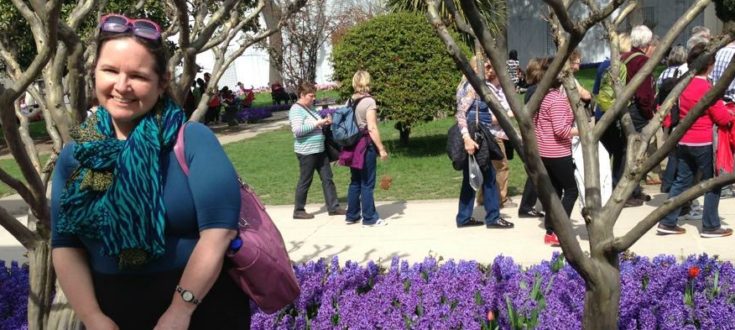Building Global Family Values in Cincinnati

Michele is a native of Kennebunk, Maine, who has lived in Cincinnati and worked in Research & Development for Procter & Gamble for the past 26 years, including two global assignments. Her first international experience was as an exchange student to Belgium, at 15, which started a lifetime love of learning about other cultures and travel. She is a mom to Joshua & Benjamin who share a love of cultural understanding through their experiences with Children’s International Summer Village (CISV) and family travel. Other interests include reading (history & historical fiction are her favorite genres), gardening, fiber arts, and drawing. Michele has been a member of the World Affairs Council – Cincinnati and Northern Kentucky for over 20 years and has seen its growth from its merger of the International Visitors Council and the World Affairs Council of Cincinnati in the early 90’s to the growing organization it is today.
Michele Mansfield, our Board Member of the Month, shares her perspective on how to nurture global family values and cultural understanding through first-hand experiences with visitors here in Cincinnati. She, along with the rest of the Board, steer us towards a sustainable future by making sure the World Affairs Council has adequate resources to advance our mission to promote global competence and awareness in our community.
Cross-Cultural Understanding From a Young Age
I grew up in a fairly homogeneous, small town in Maine, but my dad worked for a company with international reach. He traveled to Asia and Europe when I was young, bringing back stories of the people he worked with, and what he had seen. When I was 15, he arranged with a colleague in Belgium for his son to stay with my parents and for me to stay with their family for part of one summer. It was quite an experience, as we spent most of the time at a Greek restaurant, which the family partly owned. It was run by a Greek Cypriot who had been expelled from Cyprus during the conflicts in the mid-70s. Learning about his experiences over dinner conversations was my first exposure to the impact of political upheaval and forced emigration. I also learned about the “shifted schedule” that is typical in Southern Europe, where eating dinner at 10 PM is not uncommon.
The following year, I had the opportunity to participate in a 2-week homestay in Dinan, France where we stayed with families who did not speak English. We were immersed in using French and it was this experience that taught me the importance of making a sincere effort to know and use the local language when in another country. It was there, where I experienced dreaming in another language for the first time.
Cultural Exposure Carried on through Adult Life
As an adult, I continued to use the French I learned in high school and college, as I traveled to suppliers’ facilities in the Alsace region of France. While the management spoke English, the manufacturing and lab workers with whom we were conducting experimental trials spoke only French. Being able to communicate with them in their language went a long way toward meeting the objectives of the work and building mutual trust and respect.
In the late 1990’s, a friend that worked for the International Visitors Council recruited my family to host teachers from South Africa two years in a row. Even though my husband had been a missionary there during apartheid, we both learned so much from these women, one from Cape Town and the other from one of the former homeland areas.
As our children grew up, we learned of a program called Children’s International Summer Village (CISV) that was founded in 1950 by Doris T. Allen, a developmental psychologist at the University of Cincinnati. She believed that by creating opportunities for children of different cultures to come together to learn and make friends, they would grow up to become ambassadors for a more just and peaceful world. She had determined that eleven was the ideal age to begin these experiences. In 1979, she was nominated for a Nobel Peace Prize for her work with CISV. At 11, our boys both participated in their first Village program, where 4 eleven-year-old children (2 boys, 2 girls) and a leader from 10-12 different countries come together for one month in one of the 70 participating countries around the world. Their first experiences were in Manchester, England, and Campinas, Brazil.
Their involvement with the program as participants and leaders continued into their late teens and gave our family the opportunity to host children from many countries including the Faroe Islands. They were amazed at the size of our city, with a stadium that could hold their country’s entire population. Furthermore, we were able to host a group of 4 eleven-year-old boys from Egypt, Switzerland, Germany, and France. Fortunately, the boy from Egypt spoke English and all of the other languages well enough to be a translator when they stayed with us. The friendships our family formed through this program have opened our hearts and minds to people from all over the world. Our boys, through the curriculum of the program, have learned about false biases, conflict resolution, and international relations.
Involvement with World Affairs Council
While traveling at an early age had a formative influence on my understanding of other cultures, the World Affairs Council has provided me an even greater opportunity to host an astounding array of leaders and innovators from other countries for just dinner or weekends in my home. As a host, my boys and I were personally exposed to a variety of topics and cultures, including women’s rights, environmental policy, education, entrepreneurship, conflict resolution, physical disabilities, trafficking, and medicine. The range of visitors we hosted included people who worked in politics, government, law, technology, and more.
As my desire to explore more global opportunities in Cincinnati grew, I found being a volunteer with the World Affairs Council to be the perfect way to continue to expand my global awareness. The vision of the World Affairs Council, “A culturally aware and respectful citizenry engaged with the world”, resonates deeply with my own values, which include a passion for continuous learning, most importantly, learning about different cultures. My life has been enriched by so many of the people I have hosted through the Council, either for dinners or as an overnight host. I believe that building relationships with people from other cultures, one person at a time, is a small step toward achieving world peace and that if enough of these encounters happen, there is hope for conflict resolution across cultures and beliefs on both a local and global scale. As Mark Twain famously stated, in Innocents Abroad:
“Travel is fatal to prejudice, bigotry, and narrow-mindedness, and many of our people need it sorely on these accounts.”
Through my involvement with the World Affairs Council I’ve also had the opportunity to meet a young woman who is the Associate Minister of the Environment for Japan, and a young woman from Indonesia, who became deaf in both ears at the age of 9. She now advocates for people with disabilities in her country. The Indonesian woman has written two books and runs an organization to help women entrepreneurs. Not only have I learned so much firsthand about the situations in their countries, their personal experiences, and our commonalities, but also I have been inspired by their passion for their work, and for making the world a better place.
This type of “citizen diplomacy” is available to anyone in our community, by volunteering as a host. It is my experience that these relationships can change one’s life, expand one’s world-view, and shake up preconceived ideas about any given culture that one might have. I feel fortunate to be able to continue to work with the World Affairs Council to bring these opportunities to adults and students in the Cincinnati and Northern Kentucky region, for…


